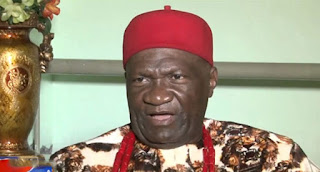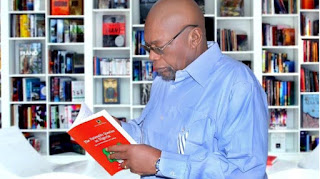What Is In Your Hand? An Open Letter To Ndigbo
 |
| Nwodo |
To say that Ndigbo are at crossroads is an understatement. The political leaders have failed to deliver development to ala Igbo, while the traditional leaders are there only to sell chieftaincy titles to the highest bidder and the youths are listening to those they should avoid by all means.
In the midst of this is a federal government (not restricted to the present administration) that has deliberately denied Ndigbo their fair share of our national resources in which part of the major ingredients for baking the national cake come from ala Igbo (Imo and Abia states are oil producing states), and yet the region only receives crumbs from the master’s table. But the Igbo has the adage, “onye ajuru ona aju onwe ya?” meaning (If you are rejected by others, do you also reject yourself?). The Igbo political elite and others have adduced several solutions to the Igbo quagmire.
Some have suggested that the solution to the Igbo problem is secession. In this group includes the Indigenous People of Biafra (IPOB). To them separatism is the silver bullet that would solve Igbo developmental challenge in the 21st Century.
However, what they demand appears to be at variant from what most Ndigbo wanted as the fact on the ground show that (the vast majority) by their economic decisions actually believe in one Nigeria, a fair and just Nigeria and they have been speaking with their money and investment all over Nigeria. “According to S. Maliga research result by an Independent body show that 74% of investment in Lagos are own by Igbos, 5% by Hausa/Fulani, 15% by Foreigners (Non-Nigerians), 5% by other Nigerians (Non-Igbo, Hausa and Yoruba), 1% by Yorubas which include Mike Adenuga. C. Udegbe in an article titled, “The Igbos Have More At Stake In Nigeria,” published in July 26, 2013 in Vanguard newspaper, added that statistics shows in Lagos that Igbos investment is not less than N300 trillion; it is double of that in Abuja at about N600 trillion; In Kano and Kaduna, Igbo investment run up to N10 trillion respectively, while in Borno, Yobe and Adamawa States, Igbo investment run into N5 trillion respectively; In Plateau State, Igbo investment is hovering over N15 trillion.” This independent research finding was cited by Nafiu, Akeem Tunde and Orugun, Juwon Johnson, from Kogi State University, Nigeria in a research titled, “An Exploratory Study Of Igbo Entrepreneurial Activity And Business Success In Nigeria As The Panacea For Economic Growth And Development” and published in International Journal of Scientific & Technology Research Volume 3, Issue 9, September 2014.
Also note that Mallam Nasir El-Rufai the present governor of Kaduna State, when he was the minister of the Federal Capital Territory (FCT) Abuja in 2007 declared that Igbos have acquired about 73 percent of landed property in Abuja. Speaking on a lighter mood, el-Rufai called on the Igbos to take Abuja as the sixth state of the southeast in view of their dominance of the real estate sector of the FCT. He pointed out that such dominance explains why the Igbos appear to have been the worst victims of the demolition exercise in the territory. For instance, he said “68 percent of the land allocations in the FCT belongs to the 19 northern states, but in actual land ownership, 73 percent belongs to the Igbos with the most aggressive in land ownership belonging to the indigenes of Anambra state, while Ebonyi lags behind.”
There are Ndigbo who believe that the Igbo solution is in the restructuring of Nigeria to a true federalism, something akin to the 1963 constitution. Here you find our respected elders in Ohanaeze Ndigbo championing this cause. There is no doubt that restructuring of Nigeria would be good for Ndigbo, and indeed all Nigerians, but the prospect of that happening seem remote going by the body language of Nigeria’s leadership, especially as some think that only the National Assembly can restructure the country through constitutional amendment, which is at variant from what Ohanaeze and Yoruba apex socio-cultural organization, Afenifere are suggesting.
Still, there are others who want the 2023 presidency to be zoned to the South East (Igbo heartland) to finally assimilate the Igbo into the mainstream of Nigeria’s politics 50 years after the Civil War in which over 3million lives was lost. Now supposing that all these expectations of Ndigbo never materialized, what should they do going forward? That is the crux of this letter.
What should Ndigbo do? Good enough, Igbos are majorly people of faith. That is why I chose to call the title of this open letter, “What is in your hand…?” What is in the hand of Ndigbo?
Exodus 17: 1-6, “The whole Israelite community set out from the Desert of Sin, traveling from place to place as the LORD commanded. They camped at Rephidim, but there was no water for the people to drink. So they quarreled with Moses and said, "Give us water to drink." Moses replied, "Why do you quarrel with me? Why do you put the LORD to the test?" But the people were thirsty for water there, and they grumbled against Moses. They said, "Why did you bring us up out of Egypt to make us and our children and livestock die of thirst?" Then Moses cried out to the LORD, "What am I to do with these people? They are almost ready to stone me." The LORD answered Moses, "Walk on ahead of the people. Take with you some of the elders of Israel and take in your hand the staff with which you struck the Nile, and go. I will stand there before you by the rock at Horeb. Strike the rock, and water will come out of it for the people to drink."
From the above Bible story, Israel needs water and what did God do? He told Moses to use what is in his hand, “the staff” to generate water.
Mathew 15: 32-34 “ Then Jesus called his disciples unto him, and said, I have compassion on the multitude, because they continue with me now three days, and have nothing to eat: and I will not send them away fasting, lest they faint in the way. And his disciples say unto him, Whence should we have so much bread in the wilderness, as to fill so great a multitude? And Jesus saith unto them, How many loaves have ye? And they said, Seven, and a few little fishes.”
Here you see that Jesus wants to feed the people and the disciples asked him where are they going to get the food? And Jesus asked, “What is in your hand?” And what was in the disciples’ hands was enough to solve the problem. What Ndigbo have at hand can solve Igbo development challenges. Trillions of Naira federal allocations have flooded ala Igbo since 1999, what did our governors, ministers from South East do with it? It is time for Ndigbo to begin to hold our leaders accountable the way we do those entrusted with our resources in town unions. The money that has entered ala Igbo from federal allocation could have turned the area to Dubai if only it was well utilized for the development of the area. When we rightly cry out that all federal roads in the South East are bad, what about state roads that our people in government are saddled with the responsibility to build and rehabilitate? Are our states roads any better? And the solution is in our hands.
God has put resources in the hands of Ndigbo to the extent that they own 73 per cent of properties in Abuja (note, these lands were never originally allocated to them, they bought it at exorbitant prices from original allottees who are non-Igbo) and control businesses in Lagos, yet they have failed to even establish branches of their businesses in the South East to generate jobs for the teeming youths with the exception of people like Innocent Chukwuma of Innoson Motors and others who are turning Nnewi to the industrial heartland of Ndigbo. Nnewi businessmen have shown the light, Ndigbo should follow that path.
There should be deliberate efforts by Ndigbo at home and diaspora to set up industries in the south east and from there distribute to the whole of Africa. Obviously, there are challenges and there will continue to be challenges, but I have no doubt that if Ndigbo put their mind to it the challenges shall be overcome and we can build a region in which its people (young people especially) don’t need to go elsewhere in search of greener pasture, except to expand the markets for their industrial goods in Africa and beyond. God has put the development of ala Igbo in our hands and not in the hand of the federal government of Nigeria. That said, it does not mean that we will not be demanding for our rights to be given to us by the federal government when developmental projects are being allocated to various zones across the country.

Comments
Post a Comment